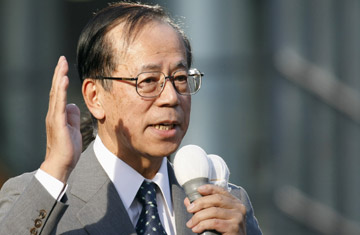
Japanese presidential candidate and former Chief Cabinet Secretary Yasuo Fukuda gives a speech in Tokyo, September 16, 2007.
It was fitting that the first official day of campaigning for the presidency of Japan's ruling Liberal Democratic Party (LDP) — and at least temporarily, the prime ministership — should come Sept. 17, on keiro no hi, or "Respect for the Aged Day." Japan's political old guard, shunted aside under just-resigned Prime Minister Shinzo Abe, is back with a vengeance, and the consensus pick to be the next leader of Japan is a 71-year-old veteran who was rejected last year in part because he was considered too elderly. Yasuo Fukuda, an LDP Diet member who'd disappeared into the background in recent years, leads LDP Secretary-General — and erstwhile front-runner — Taro Aso in the polls. More importantly, Fukuda has the support of influential factions of LDP legislators who will almost certainly prove dominant when the party convenes to pick a new leader on Sept. 24.
It wasn't supposed to be this way. In the immediate aftermath of Abe's sudden resignation on Sept. 12, it was Aso — the conservative, high profile ex-Foreign Minister — who had the inside track. A comic book–loving populist — his most recent book was titled Awesome Japan — Aso had finished second to Abe in last year's LDP presidential election, and generally scored well with the public. But like a radioactive bomb, Abe's departure was so disastrous that it contaminated anyone near him, particularly Aso, who reportedly knew of the Prime Minister's coming resignation days before it was announced.
With Aso seen as damaged goods, a consensus rapidly formed around Fukuda, a safe if dull choice who wouldn't hurt the LDP, as Abe, who led the party to an historic electoral defeat at the end of July, so clearly had. "This is a self-preservation move for the party," says Carol Gluck, a professor of Japanese history at Columbia University. "This is seen in the party as a safer choice for regrouping the LDP." Even Fukuda himself seemed to recognize that he was parachuting into a caretaker role. "Our party faces an emergency," he told LDP members gathered at the party's Tokyo headquarters on Sept. 15. "I will do my utmost to restore public trust."
That much Fukuda can likely accomplish. As chief cabinet secretary for popular former Prime Minister Junichiro Koizumi — a post he held for a record 1,259 days, a period unmatched by any other post World War II minister — Fukuda earned a reputation for calm competency that should appeal to a public and a party still shocked by the utter disintegration of Abe's administration. But it seems far less likely that Fukuda will be able to help the LDP at the ballot box. (Legislative elections aren't scheduled until 2009, but with the opposition empowered by its recent win, early polls seem inevitable.) Clever and even cutting in person, Fukuda was always happy to give candid assessments of his LDP rivals, albeit off the record. However, the Diet veteran has zero charisma on the campaign trail. That used to be the norm for Japanese Prime Ministers, but the dramatic Koizumi changed public expectations. Unfortunately for the LDP, as Gluck points out, "there are no more Koizumis waiting in the wings."
As Prime Minister, Fukuda seems likely to continue the general course of the Abe administration, albeit with a more moderate touch. He also seems less willing to prioritize the U.S. alliance at the expense of Japan's Asian relations. Though not an opponent of economic reform, Fukuda is unlikely to risk taking any chances, which means needed changes like a consumption tax increase will stay on the shelf, even as Japan's recovery loses steam. For now, after the tumult of July's election and Abe's exit, Japan seems to be in a holding pattern, with tradition-bound hands — and gray heads — back in the cockpit.
